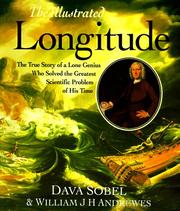Check nearby libraries
Buy this book

"The Illustrated Longitude recounts in words and images the epic quest to solve the thorniest scientific problem of the seventeenth and eighteenth centuries. Throughout the great age of exploration, sailors attempted to navigate the oceans without any means of measuring their longitude: All too often, voyages ended in total disaster when both crew and cargo were captured or lost upon the rocks of an unexpected landfall.
Thousands of lives and the fortunes of seafaring nations hung on a resolution."--BOOK JACKET.
"To encourage a solution, governments established major prizes for anyone whose method or device proved successful. The largest reward of [pound]20,000 - truly a king's ransom - was offered by the British Parliament in 1714. The scientific establishment - from Galileo to Sir Isaac Newton - had been certain that a celestial answer would be found and invested untold effort in this pursuit.
In stark contrast, one man, John Harrison, imagined and built the unimaginable: a clock that solved the problem by keeping precise time at sea, called today the chronometer. His trials and tribulations to win the prize throughout a forty-year obsession are the culmination of this remarkable story."--BOOK JACKET.
Check nearby libraries
Buy this book

Previews available in: English German
Subjects
Royal Society, Harrison timekeepers, Kendall timekeepers, Lunar distance method, Lunar tables, chronometer, GMT, Literature in Italian, History, Biography, Chronometers, Clock and watch makers, Measurement, Longitude, Long Now Manual for Civilization, Nonfiction, Science, Horology, Astronomical clocks, Research, Harrison, john, 1693-1776, Chronomètre, Navigatie, Sterrenkunde, Histoire, Scheepvaart, Horlogemakers, Geografische lengte, Large type books, Geography, Navigasjon, Biografi, Clocks and watch makers, Astronomical clock, Biographie, Schiffschronometer, Geografische Länge, Messung, Great britain, biography, Scientists, Social & cultural aspects of technology, Scientists - biography, Science - applied, Applied science, General & miscellaneous transportation, Physics, Exploration & discovery, Scient, Biography and autobiographyPeople
John Harrison, Isaac Newton, Galileo Galilei, Edmond Halley, Larcum Kendall, John Harrison (1693-1776)Places
Great Britain, EnglandTimes
Eighteenth CenturyShowing 10 featured editions. View all 39 editions?
Book Details
Edition Notes
Includes bibliographical references and index.
Originally published: Longitude. New York : Walker, 1995.
Classifications
The Physical Object
Edition Identifiers
Work Identifiers
Source records
Scriblio MARC recordLibrary of Congress MARC record
marc_openlibraries_phillipsacademy MARC record
marc_openlibraries_sanfranciscopubliclibrary MARC record
Internet Archive item record
Library of Congress MARC record
Promise Item
marc_columbia MARC record
First Sentence
"Once on a Wednesday excursion when I was a little girl, my father bought me a beaded wire ball that I loved."
Work Description
The dramatic human story of an epic scientific quest and of one man's forty-year obsession to find a solution to the thorniest scientific dilemma of the day--"the longitude problem."
Anyone alive in the eighteenth century would have known that "the longitude problem" was the thorniest scientific dilemma of the day-and had been for centuries. Lacking the ability to measure their longitude, sailors throughout the great ages of exploration had been literally lost at sea as soon as they lost sight of land. Thousands of lives and the increasing fortunes of nations hung on a resolution. One man, John Harrison, in complete opposition to the scientific community, dared to imagine a mechanical solution-a clock that would keep precise time at sea, something no clock had ever been able to do on land.
Longitude is the dramatic human story of an epic scientific quest and of Harrison's forty-year obsession with building his perfect timekeeper, known today as the chronometer. Full of heroism and chicanery, it is also a fascinating brief history of astronomy, navigation, and clockmaking, and opens a new window on our world.
Community Reviews (0)
History
- Created April 1, 2008
- 14 revisions
Wikipedia citation
×CloseCopy and paste this code into your Wikipedia page. Need help?
| July 18, 2024 | Edited by MARC Bot | import existing book |
| May 4, 2023 | Edited by ImportBot | import existing book |
| May 2, 2021 | Edited by Drini | Merge works |
| November 28, 2020 | Edited by MARC Bot | import existing book |
| April 1, 2008 | Created by an anonymous user | Imported from Scriblio MARC record |





















